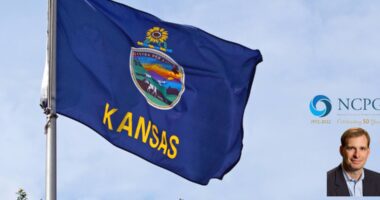Legal sports betting in Kansas will begin in tandem with the 2022 NFL season kickoff on Sept. 8.
But with the excitement of launch day, it’s imperative that visitors and residents of Kansas are also aware of available responsible gambling tools.
The National Council on Problem Gambling (NCPG) Executive Director Keith Whyte spoke to PlayUSA recently to discuss newly legalized sports betting in Kansas and the concerns that come with it. Whyte also noted that sportsbook operators could play a key role in suppressing compulsive gambling; however, he feels the usage of responsible gambling tools is extremely low.
A longtime legal gambling state, Kansas already has some helpful tools in place
Sports betting happens to be the newest form of legal gambling in Kansas, but many other types have been available for decades. These include:
- Lottery
- Four state-owned casinos
- Six tribal casinos
- Horse racing
Therefore, many programs, resources and tools already exist.
The Kansas Coalition on Problem Gambling has a well-rounded collection of helpful information and links including digital brochures, resources and a self-assessment.
The state’s Department of Aging and Disability Services provides services treatment and prevention programs for addictions including gambling.
And of course, there is always the national Gam-Anon 12-step recovery program. It features both virtual and in-person meetings by state (where available).
Self-exclusion in Kansas
The self-exclusion program in Kansas is completely voluntary. Those who apply are voluntarily agreeing to be banned from creating an online betting account or entering any state-owned casino in Kansas. Applicants can choose how long they would like to be excluded, whether two years or a lifetime.
To participate in the program, applicants must present a government-issued photo ID and apply in person at the Kansas Racing and Gaming Commission office or at any state-owned casino.
Kansas sports betting bill already factored in problem gambling
These tools will be undoubtedly needed as legal betting begins in Kansas with 12 operators. But going live has been a long and difficult road, especially when it came to provisions in the bill that finally passed.
The National Council on Problem Gambling successfully advocated for stronger problem gambling language in the bill. The new law earmarks 2% of revenue to be funneled to the problem gambling programs in Kansas.
The NCPG-specific problem gambling provisions are:
Tools, information for gamblers
Kansas sports betting operators are required to:
- “Prominently display” tools to set limits on the time and money spent on gambling.
- “Prominently display” information to help identify compulsive gambling behavior.
- Allow users to exclude certain payment methods.
- Display ways to seek problem gambling help online or via a toll-free number.
- Exclude the use of specific electronic payment methods.
The law also requires that advertisements “do not target children, minors or other vulnerable persons.”
How will Kansas keep funding responsible gambling resources?
Tax dollars fund responsible gambling resources in Kansas.
“On paper, Kansas should have the most well-funded problem gambling system in the US, as 2% of casino revenue is designated for problem gambling. But, in practice, we estimate 90% of that money is currently diverted to other addictions and other uses by the state government.”
Every July, the Director of Accounts and Reports will transfer 2% of the remaining money credited to the Kansas Lottery Operating Fund. The funds will be transferred from sports wagering revenues to the Problem Gambling and Addictions Grant Fund after the initial credit to the White Collar Crime Fund.
Responsible gambling features ‘rarely promoted’
Ahead of Kansas’ launch, Whyte reiterates that sports betting operators could be part of the solution.
“It depends on how the operators tune those apps and whether or not the users take advantage of the responsible gambling features.”
Kansas gaming regulators could enforce sportsbooks to utilize the full suite of gambling protection tools. Whyte says the NCPG’s responsible gambling features should be the standard on every new account.
“We strongly encourage opt-out, or just making them required altogether since there’s no law that says an operator can’t make their players set limits or can’t provide information on a monthly basis on how much a person has spent or how their spending compares to other users.”
“Right now, in the US, in most cases, those responsible gambling tools and features are opt-in and are rarely promoted. And so, we know the uptake in general across the United States of these responsible gambling tools on apps is extremely low, which doesn’t help the players; it doesn’t help the operators. It doesn’t help the state.”
Gambling education benefits player, operator
Whyte believes sportsbook operators can help create value among their customers by teaching some gambling basics.
Whte said: “And, I think there are many ways the operators could do that. We believe that the more you inform your player, the better lifetime value you’ll create in that player.”
“For both new and seasonal players, an operator can help create better lifetime value among players by educating the new people on the basics of sports betting on how to recognize and understand the odds. As for the existing players coming in from the offshore market, operators can help them understand a little bit more about playing, setting time limits, and playing within your budget; things that offshore operators tend not to encourage.”
Operators could go the extra mile and tap into user data to help the operator and the customer understand their gambling habits. According to Whyte, data visualization tools could help players understand where their gambling is now and if some big changes occur over time.
“Player history may help gamblers realize that their spending of an average of $100 a week is now $1,000 a month. That’s a huge change in players’ behavior. It should be easily accessible, visually impactful, and tell a story of the players’ performance and even their risk for gambling.”
Get problem gambling help through NCPG
If you or someone you know has a gambling problem anywhere in the US, help is available 24 hours a day at no cost. Contact the National Problem Gambling Helpline at 800-522-4700.


